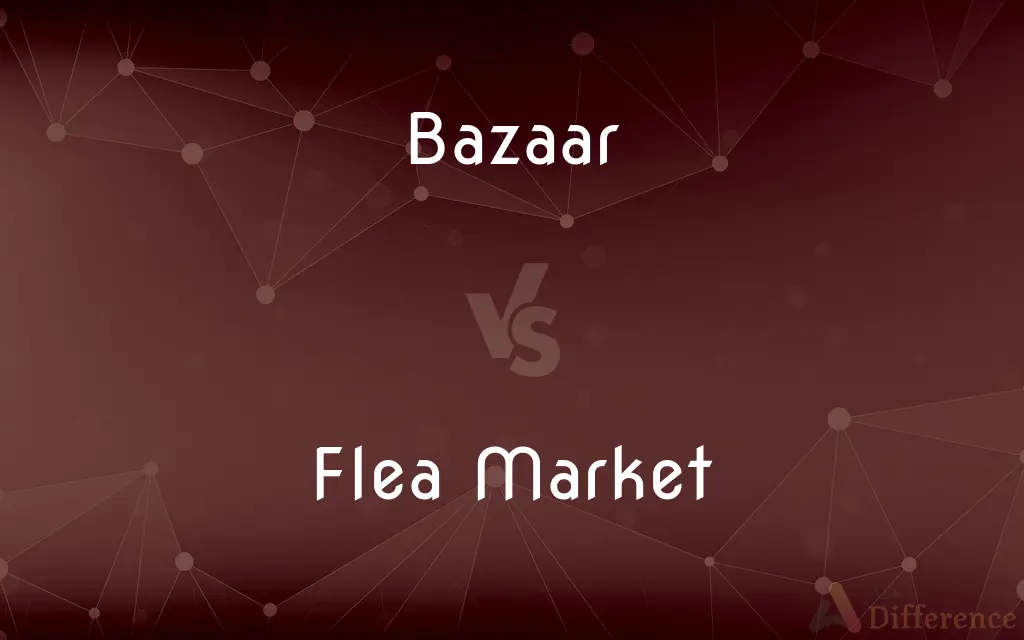Bazaar vs. Flea Market — What's the Difference?
Edited by Tayyaba Rehman — By Fiza Rafique — Published on December 21, 2023
A bazaar is a permanent marketplace often found in Middle Eastern and South Asian countries, while a flea market is a temporary venue where individuals sell used or vintage goods.

Difference Between Bazaar and Flea Market
Table of Contents
ADVERTISEMENT
Key Differences
Bazaars are often associated with Middle Eastern and South Asian cultures. They are typically permanent structures or areas in a city where merchants gather to sell goods. Flea markets, on the other hand, are more transient in nature and are frequently set up in various locations like open fields, parking lots, or indoor spaces.
In a bazaar, one might find an array of items, from fresh produce to clothing, jewelry, and handcrafted goods. These markets often represent the cultural and traditional essence of the region. Flea markets primarily focus on vintage items, antiques, second-hand goods, and sometimes crafts or food stalls. The emphasis is on finding unique or collectible items.
Bazaars have been in existence for centuries, serving as central trading hubs in ancient cities. They're deeply rooted in the history and commerce of their regions. Flea markets have a more modern origin, often emerging as places for individuals to sell unwanted items or as gatherings for antique enthusiasts.
The ambiance and experience differ between the two as well. A bazaar is often bustling, with established stalls, regular merchants, and a more organized setup. A flea market can be more informal, with sellers setting up temporary tables or booths, and the inventory can change each time the market is held.
Visiting a bazaar often feels like a dive into the culture and tradition of a place, offering a more structured shopping environment. A trip to a flea market can feel like a treasure hunt, never quite knowing what unique or vintage item one might come across.
ADVERTISEMENT
Comparison Chart
Origin
Middle Eastern & South Asian
Western cultures
Duration
Permanent
Temporary
Main Goods
Fresh produce, clothing, handcrafts
Vintage items, antiques, second-hand goods
Historical Context
Ancient trading hubs
Modern gatherings for antique enthusiasts
Experience
Cultural dive, structured shopping
Treasure hunt, informal setup
Compare with Definitions
Bazaar
A permanent marketplace in Middle Eastern and South Asian countries.
We shopped for spices at the local bazaar.
Flea Market
A temporary venue selling used or vintage goods.
I found a rare vinyl record at the flea market.
Bazaar
A venue for various goods, from produce to jewelry.
I bought a beautiful carpet at the bazaar.
Flea Market
Set up in various locations, from fields to indoor spaces.
This weekend, there's a flea market in the town's parking lot.
Bazaar
A place of commerce deeply rooted in tradition and culture.
The bazaar was filled with handcrafted goods from the region.
Flea Market
A gathering for antique enthusiasts and collectors.
The flea market was filled with collectible toys.
Bazaar
An organized setup with established stalls.
Merchants at the bazaar displayed colorful textiles.
Flea Market
Emphasizes unique or second-hand items.
I bought a vintage dress for a steal at the flea market.
Bazaar
Represents the essence of regional commerce.
The bazaar was a hub for traders and artisans.
Flea Market
An informal setup with changing inventory.
Each time I visit the flea market, I discover new treasures.
Bazaar
A market consisting of a street lined with shops and stalls, especially one in the Middle East.
Flea Market
Alternative form of flea market
Bazaar
A shop or a part of a store in which miscellaneous articles are sold.
Bazaar
A fair or sale at which miscellaneous articles are sold, often for charitable purposes.
Bazaar
A marketplace, particularly in the Middle East and South Asia, and often covered with shops and stalls.
Bazaar
A shop selling articles that are either exotic or eclectic.
Bazaar
A fair or temporary market, often for charity.
Bazaar
In the East, an exchange, marketplace, or assemblage of shops where goods are exposed for sale.
Bazaar
A spacious hall or suite of rooms for the sale of goods, as at a fair.
Bazaar
A fair for the sale of fancy wares, toys, etc., commonly for a charitable purpose.
Bazaar
A shop where a variety of goods are sold
Bazaar
A street of small shops (especially in Orient)
Bazaar
A sale of miscellany; often for charity;
The church bazaar
Common Curiosities
How does a flea market differ from a bazaar?
A flea market is a temporary venue, primarily selling used or vintage goods, whereas a bazaar is a permanent marketplace.
Can I find new products at a flea market?
While flea markets primarily sell used or vintage items, some vendors might offer new or handcrafted products.
Can I sell my old items at a flea market?
Yes, many flea markets allow individuals to rent booths or tables to sell their items.
What is a bazaar?
A bazaar is a permanent marketplace often found in Middle Eastern and South Asian countries.
What kind of items can I find at a bazaar?
At a bazaar, you can find an array of items from fresh produce to clothing, jewelry, and handcrafted goods.
Are flea markets held indoors or outdoors?
Flea markets can be both indoors and outdoors, depending on the venue and region.
Do bazaars only operate during certain hours?
Most bazaars have specific operating hours, often in line with local business hours.
Are bazaars only present in the Middle East and South Asia?
While bazaars are most commonly associated with these regions, similar markets exist worldwide under different names.
Are flea markets cash-only?
Many flea markets are cash-preferred, but some vendors might accept electronic payments.
How old are bazaars historically?
Bazaars have been in existence for centuries, serving as trading hubs in ancient cities.
Share Your Discovery

Previous Comparison
ATL Marketing vs. BTL MarketingAuthor Spotlight
Written by
Fiza RafiqueFiza Rafique is a skilled content writer at AskDifference.com, where she meticulously refines and enhances written pieces. Drawing from her vast editorial expertise, Fiza ensures clarity, accuracy, and precision in every article. Passionate about language, she continually seeks to elevate the quality of content for readers worldwide.
Edited by
Tayyaba RehmanTayyaba Rehman is a distinguished writer, currently serving as a primary contributor to askdifference.com. As a researcher in semantics and etymology, Tayyaba's passion for the complexity of languages and their distinctions has found a perfect home on the platform. Tayyaba delves into the intricacies of language, distinguishing between commonly confused words and phrases, thereby providing clarity for readers worldwide.














































